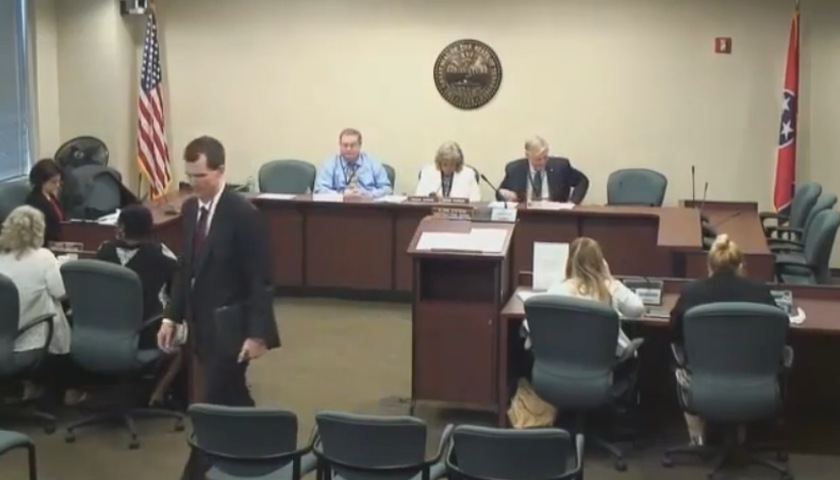A Tennessee businessman said he couldn’t sell his state-of-the-art security software because members of a state board told him no.
But those regulators, specifically the five-member Alarm Systems Contractors’ Board, said that’s not true, because they never made a final decision on the matter.
But go over the video and transcripts of one key meeting, said Braden Boucek, director of litigation for the Beacon Center of Tennessee, a Nashville-based free market think tank.
It all boils down to board members telling the businessman, Adam Jackson, he had to get a license to sell his product.
The Tennessee Star went over the transcripts and video of one key meeting. Board members explicitly told Jackson repeatedly to get licensed.
“At no point do they ever indicate that he might not need a license, or that if he did his business differently, they’d change their mind,” Boucek said.
During the meeting, board members read state law to Jackson to back up their position. At another point, board members said they didn’t write the law, but they were trying to uphold it.
As reported, this board has existed since 1993.
Members meet regularly to license, register, and regulate alarm systems contractors. They also judge whether alarm system contractors are competent at their jobs, according to the board’s website.
Going by what Beacon says, the board, by a 3-2 vote, reversed an earlier decision to classify Jackson’s product as an alarm system.
Jackson is selling facial recognition software that instantly scans the face of someone using existing security cameras and compares the image against known offender databases.
Board members, Beacon said, wrongfully determined this is an alarm system. State law requires Jackson spend five years trying to obtain a government license before he can sell his product.
‘We Need A New Process’
Kevin Walters, spokesman for the Tennessee Department of Commerce and Insurance, whose jurisdiction the board falls under, said board members’ comments at that meeting do not constitute an official board action.
“Without a motion and vote by the board (which did not occur regarding this issue until the Declaratory Order request was heard), it is not possible to say what the Board’s position was, irrespective of what any member or representative of the board expressed as their individual understanding,” Walters said in an emailed statement.
The Star sent Walters transcripts of the meeting.
“I’ve read it over, I see no action by the board,” Walters said.
All this, Boucek said in an email, is bureaucratic gobbledygook.
“The board keeps relying on this hyper technical point of administrative procedure, that since it wasn’t an official vote (that no one ever told Adam he had a right to ask for) then this wasn’t an official ‘decision’ and no one actually told him he had an alarm,” Boucek said.
“Any person who hears these words from an agency and their attorney would believe that if they sold their product without a license then the board would take enforcement actions. Unlicensed activity is punishable by heavy fines and jail time.”
The fact that board members don’t see this as a problem, Boucek said, is the problem.
“Trying to confuse things by hiding behind obscure administrative procedural technicalities is more what we expect out of pettifogging Tammany Hall hucksters, not officials we pay to serve and protect,” Boucek said.
“Obviously, the fact that the processes available were so complex that the board can still find room to fault him makes the case that we need a new process.”
– – –
Chris Butler is an investigative journalist at The Tennessee Star. Follow Chris on Facebook. Email tips to [email protected].





